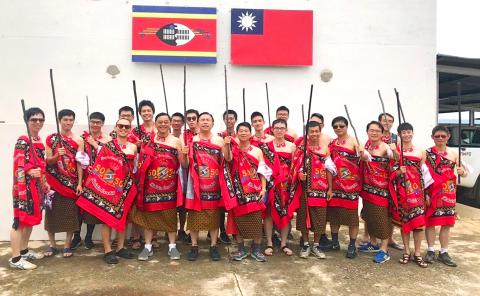Eswatini remains a staunch ally despite China’s political and economic pressure, the Ministry of Foreign Affairs said late on Sunday, after Beijing reportedly threatened to cut business ties with the African nation if it maintained diplomatic ties with Taiwan.
“Eswatini has reiterated its firm intentions to deepen its diplomatic relations with Taiwan, even in the face of pressure from China,” ministry spokeswoman Joanne Ou (歐江安) said in a statement.
The ministry wishes to express its “sincere appreciation and highest respect” to Eswatini for standing up to China’s efforts at suppression, she said, adding that Beijing was “rudely interfering in the economic activities of another nation.”

Photo: Screen grab from Twitter
The Times of Swaziland reported late last month that an undated statement reportedly issued by the Chinese embassy in Pretoria, South Africa, said that visa applications by Swazi citizens would be processed only at that embassy.
“According to the latest notification of the Chinese government, starting from January 10, 2020, visa applications of Swaziland citizens to mainland China will be processed by the Chinese embassy in South Africa,” the newspaper said on Jan. 24. “At the same time, the Chinese Visa Application Service Centre and other Chinese diplomatic missions will not accept the applications anymore.”
Citizens of Eswatini used to be able to apply for China visas at any Chinese embassy or consulate office in South Africa.
South Africa’s Daily Maverick reported that Chinese Ambassador to South Africa Lin Songtian (林松添) indicated in a statement that not only have restrictions been imposed on visa applications, but his embassy could also keep a close watch on Swazi citizens planning to travel to China.
“Such an embarrassing situation is the result of Eswatini defying the ‘one China’ principle and maintaining so-called ‘diplomatic ties’ with the Taiwan authorities, a province of the PRC,” the Daily Maverick quoted Lin as saying in the statement.
The paper also reported that China was threatening to “cripple” Eswatini economically if it did not immediately switch recognition from Taiwan to China.
“No diplomatic relations, no more business benefits,” it quoted Lin as saying. “To maintain such an immoral and abnormal relations [sic] with Taiwan authority politically disregards the Eswatini national dignity, economically disregards the interest of its country and people.”
The Times of Swaziland reported that Beijing might have convinced Chinese businesses to stop trading with Swazi companies.
The Ministry of Foreign Affairs said it is fully aware of Beijing’s actions against Eswatini and has been in close contact with Prime Minister Ambrose Mandvulo Dlamini, Minister of Foreign Affairs Thulisile Dladla and other top officials.
Taiwan would help Eswatini uphold its national dignity, the ministry said, responding to information it said it had obtained from its embassy in the African country.

‘DENIAL DEFENSE’: The US would increase its military presence with uncrewed ships, and submarines, while boosting defense in the Indo-Pacific, a Pete Hegseth memo said The US is reorienting its military strategy to focus primarily on deterring a potential Chinese invasion of Taiwan, a memo signed by US Secretary of Defense Pete Hegseth showed. The memo also called on Taiwan to increase its defense spending. The document, known as the “Interim National Defense Strategic Guidance,” was distributed this month and detailed the national defense plans of US President Donald Trump’s administration, an article in the Washington Post said on Saturday. It outlines how the US can prepare for a potential war with China and defend itself from threats in the “near abroad,” including Greenland and the Panama

A wild live dugong was found in Taiwan for the first time in 88 years, after it was accidentally caught by a fisher’s net on Tuesday in Yilan County’s Fenniaolin (粉鳥林). This is the first sighting of the species in Taiwan since 1937, having already been considered “extinct” in the country and considered as “vulnerable” by the International Union for Conservation of Nature. A fisher surnamed Chen (陳) went to Fenniaolin to collect the fish in his netting, but instead caught a 3m long, 500kg dugong. The fisher released the animal back into the wild, not realizing it was an endangered species at

The High Prosecutors’ Office yesterday withdrew an appeal against the acquittal of a former bank manager 22 years after his death, marking Taiwan’s first instance of prosecutors rendering posthumous justice to a wrongfully convicted defendant. Chu Ching-en (諸慶恩) — formerly a manager at the Taipei branch of BNP Paribas — was in 1999 accused by Weng Mao-chung (翁茂鍾), then-president of Chia Her Industrial Co, of forging a request for a fixed deposit of US$10 million by I-Hwa Industrial Co, a subsidiary of Chia Her, which was used as collateral. Chu was ruled not guilty in the first trial, but was found guilty

DEADLOCK: As the commission is unable to forum a quorum to review license renewal applications, the channel operators are not at fault and can air past their license date The National Communications Commission (NCC) yesterday said that the Public Television Service (PTS) and 36 other television and radio broadcasters could continue airing, despite the commission’s inability to meet a quorum to review their license renewal applications. The licenses of PTS and the other channels are set to expire between this month and June. The National Communications Commission Organization Act (國家通訊傳播委員會組織法) stipulates that the commission must meet the mandated quorum of four to hold a valid meeting. The seven-member commission currently has only three commissioners. “We have informed the channel operators of the progress we have made in reviewing their license renewal applications, and